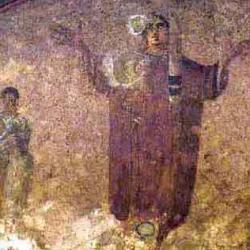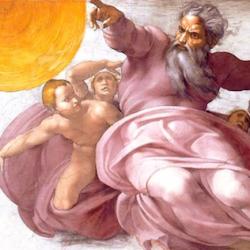The question here is not, Did Allah create? The question is, Is it conceivable that a god like Allah could create the world? Does it make any sense to say that an absolutely sovereign but Unitarian god created the universe?
Our first reaction might be: Why not? If Allah is sovereign and all-powerful, surely he can make things out of nothing, just like the Christian God. It doesn’t seem to take all that much, assuming of course that you’re a sovereign divine being. There’s no logical contradiction, it seems, in saying a sovereign monad molded a creation different from himself.
I disagree. Not only is it factually wrong to say Allah created the world; it’s also logically contradictory.
How so? Consider Allah’s life prior to the creation. He is completely and utterly alone. There are no eternal divine beings for him to commune with. He has never had the “experience” of otherness, since there is nothing other. He has never had the “experience” of productivity, since nothing and no one has been produced. The only thing that is is Allah, utterly and completely alone.
Already we can begin to see why Allah cannot create. He is, in himself, barren, fruitless, unproductive. In this respect, Allah is just like the Ungenerate and Unbegetting Father of the Arians, and the criticisms that Athanasius and the Cappadocians brought against Arius apply equally to Allah.
Athanasius regularly plays riffs on the biblical description of God as Light, and the claim in Hebrews (1:3) that the Son is the radiance of light. It makes no sense to say that God is un-radiant light, since radiance is of the essence of light. Thus, if the Father is Light, He must radiate an eternal Radiance, which, according to Hebrews, is the Son.
Then Athanasius pushes the point. For the Arians, the Father is a light without radiance, and that can only mean that he is fruitless and unproductive in himself. For the orthodox, by contrast, the essence of God is “fruitful in itself” (Discourses Against the Arians, 2.14.2). Since the Father is fruitful in Himself, He also is fruitful in creating. Without the Word, “things originate could not . . . be brought to be.” As a Son proper to the Father’s essence, He is the one through whom creatures come to be, without whom creation could not be at all.
The Father cannot create without His Son, any more than a Light can illuminate without its radiance.
As Athanasius puts it, “as the light enlightens all things by its radiance, and without its radiance nothing would be illuminated, so also the Father, as by a hand, in the Word wrought all things, and without Him makes nothing” (Discourses, 2.18.31).
The Father has a “generative nature” (gennetikes phuseos), since He is always with His generated Word, Wisdom, and Image that is proper to His substance (Discourses, 2.14.2). Without the eternal Son, there could be no creation. Light lightens by radiance, and if the Father’s light did not eternally radiate, it could not form the bright world of creation.
Gregory of Nyssa develops the same point in his treatise against the later Arian Eunomius. Michel Rene Barnes has argued that the Trinitarian debates of the fourth century were debates about God’s productivity, which is to say, God’s power. As Barnes puts it, “If God has a natural productive capacity, He can produce a ‘Son’ with the same nature; if God does not have a natural productive capacity [which is Eunomius’ position], whatever ‘Son’ means it cannot mean a product with the same nature as God.”
The debate about God’s inner productive is also a debate about creation. Barnes again: “If productivity is natural to God, then creating itself (a kind of productivity) has its source in God; if productivity is not natural to God, then creating must in some way have its source exterior to God. It goes almost without saying that Gregory’s understanding is that God is naturally productive and that God creates. Eunomius understands that God is not naturally productive, and creation is the function of something exterior to God’s nature.” The entire thrust of Eunomius’ theology is to protect the Arian truth that God is fruitless.
Back to Allah, and one can imagine a riposte along these lines: Allah doesn’t produce anything naturally or necessarily, but he has the capacity to produce the world, a capacity which he puts into effect. He doesn’t have any eternal other to other with, but he has the capacity to create an other and to engage with him, her, or it.
Notice what’s happening in this response. Allah, who is supposed to be utterly sovereign and independent, now needs a world to realize his latent creative potential. Allah, the all-merciful, needs creatures before he can “experience” otherness. Unfruitful in himself, he flourishes in creative productivity only by making something exterior.
Allah, utterly sovereign Allah, suddenly looks to be dependent on the existence of the world to be wholly himself. He begins to look much, much smaller than he did at the beginning. Hence the dialectical swings within Islamic theology between exalted Unitarianism and mystical pantheism.
Here are the choices then: You can have a god who remains sovereign only by having nothing to relate to, a god who remains thoroughly divine only by remaining wholly barren. You can have a god who puffs himself up to look sovereign, but who turns out to need the world as much as it needs him. Neither of these options gives us a sovereign creator.
Or, you can worship a God who is eternally productive, eternally Other in and to Himself, eternally Light and Radiance because He is eternal Radiant Light. That is to say, you can worship the Trinity, the only Creator and the only God capable of creating.












